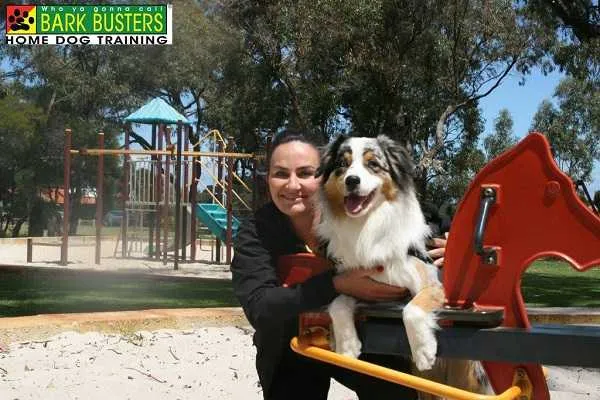The Difference Between Loving and Spoiling Your Dog

Do you love your dog? Of course, you do! If you're a Responsible Dog Owner, developing a loving relationship with your dog based on trust and respect is essential for its emotional and psychological health.
People LOVE their dogs . They are non-judgmental. They don't care about how much money we have or how much stuff we own. They don't care what we look like, what we do for a living or who we know.
Bark Busters trainers are passionate about loving their dogs, or they wouldn't be in this business. For most of us it is not really a business, but a calling. However, we know the difference between loving a dog and spoiling a dog to its own demise. Yes, you can love your dog too much.
To truly understand this, you have to look at the correlation between love and behaviour. A basic tenet of behaviour is that animals, including both dogs and people, will repeat behaviour that rewards them in some way and will not repeat behaviour which does not. This is the basis of almost every dog training system. Love is a powerful reward.
Spoiling a dog means giving them anything they want including making excuses or ignoring bad behaviours. 'He doesn't really know what he is doing' or 'he didn't mean to do that' or 'but she so enjoys it' are all phrases we as dog trainers have heard. Just because your dog enjoys chewing your slippers does not mean it's a good thing.
Dogs actually crave rules and routing. They need boundaries. A dog without boundaries can become aggressive, demanding or very proprietary of things - including their owner. It spirals out of control until owners no longer want the dog and the dog is sent to a shelter through no fault of its own. You don't want to reward behaviours you will later regret.
Conversely, loving your dog means developing a healthy relationship between you two based on respect and trust. It means you are the Pack Leader, and get to determine when the dog should be rewarded for good behaviours.
Spoiled dogs are those that drag their owners around the block on a walk, lunging at every dog and bush. It's the dog that gets you up at 3am even though they don't need to go outside to toilet - they just want attention. It's the dog who starts barking the minute you get on the phone. The dog with no manners is the one that is spoiled.
Little Brutus Grown Into Big Brutus
Let's use Brutus the Great Dane as an example. Brutus would attack his owners and guests when they walked in the door. It was not an aggressive attack, it was a "happy to see you give me attention" attack. He would jump on people, put his paws on their shoulders and lick their faces. Brutus weighs 68kgs and didn't know his own size. Without meaning to he would knock people over or rip their clothes.
Brutus was brought home when he was an eight-week-old puppy. When his pet parents arrived home from work at the end of the day, they would happily great him as soon as they got home. "Hi Brutus! How was your day? Did you miss us? With a happy and excited tone of voice. They would pet him and scratch him behind his ears. He would get excited and lick and jump on them and they would all laugh and play together. Brutus learned early on that people rewarded him for jumping on them. He thought people wanted him to be excited when they came in.
What's Love Got to Do With It?
Do you pay more attention to your dog when they are misbehaving versus behaving? If so their bad behaviour may become more exaggerated to get your attention. Dogs should always be praised a lot for good behaviours. "Rewards" can be in the form of treats, a belly rub, a scratch behind the ear, or a long walk. Your dog lives for your praise.
You need to use the power of love to your advantage. Pet your dog when they're calm and happy, not when they are excited and jumping. Reward your dog for listening and for doing what you ask them to do.
Every dog owner should love their dog. Every dog owner can spoil their dog if you are rewarding good behaviour versus just "giving in".
Recent Articles
- How To Keep Your Dog Cool in the Summer Heat
- Keep Your Dog Safe This Summer: Bark Busters’ Essential Tips
- Christmas Dog Safety Tips: Keep Your Dog Safe & Happy This Festive Season
- Dog Training for Snake Safety: Essential Tips for Australian Pet Owners
- Leash Training - How to Stop your Dog from Pulling on Walks
- Dog Aggression Training & Tips
- Halloween Safety Tips for Dog Owners
- Understanding and Training Dogs with Separation Anxiety
- Why Is My Dog Barking So Much? Understanding Excessive Barking and How To Help
- Dogs need education too!
